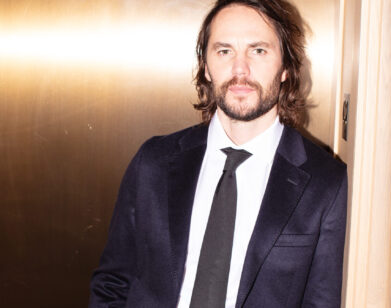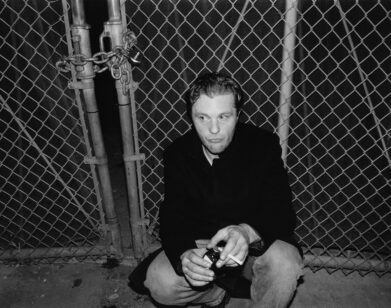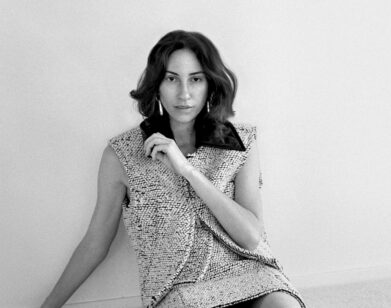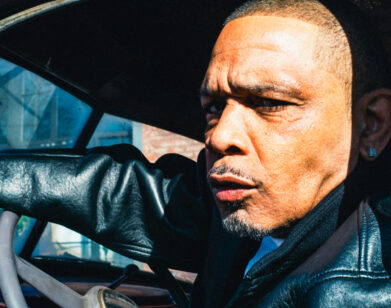The Character Actor
ABOVE: FINN WITTROCK AT 6 COLUMBUS HOTEL IN NEW YORK, DECEMBER 2014. PHOTOGRAPHY: JOVAN TODOROVIC/SEE MANAGEMENT. STYLING: ALPHA VOMERO/SEE MANAGEMENT. STYLING ASSISTANT: VINCENT CIARLARIELLO. GROOMING: ASSUMPTA CLOHESSY. SPECIAL THANKS: 6 COLUMBUS, SIXTY HOTELS, AND JENN SMUKLER.
“I caught the acting bug from my dad,” Finn Wittrock explains over the phone. An actor himself, Wittrock’s father worked at Shakespeare & Company, a summer theater company based in Lennox, Massachusetts. “I would be the pageboy or random messenger child in the plays,” he continues. “I would just sit there and listen every night. It’s probably where I learned the most, honestly.”
Wittrock, who just turned 30, is currently in New Orleans, wrapping the fourth season of FX’s anthology series American Horror Story. Though this season is titled Freak Show, and there are plenty of characters who have murdered a person or two, it is Wittrock’s spoilt and sociopathic Dandy Mott that is the most alarming. Babied by his mother Gloria, Dandy becomes obsessed with the town’s new “freak show.” He tries to join, but is rejected due to his lack of unusual physical characteristics. Dandy does not take the news well. “The sort of overarching theme of the show in a lot of ways is that Dandy looks the most normal and is the biggest freak of them all,” says Wittrock.
A graduate of Juilliard, Wittrock began his professional career in the theater. His first job after graduating was a play at the Berkshire Theatre Festival; his second was playing Romeo in an all-male production of Rome and Juliet in Washington, D.C. He spent two years on the soap opera All My Children (“a boot camp for actors”) and did a few guest spots on shows like Masters of Sex and Law & Order: SVU.
This year has been a significant one for Wittrock: he appeared in HBO’s The Normal Heart as Mark Ruffalo’s lover. On Christmas Day, his newest film, the Angelina Jolie-directed Unbroken, will come out across the U.S. Based on Laura Hillenbrand’s biography of the same name, Unbroken revolves around the experiences of former Olympic runner Louis Zamperini during World War Two. Wittrock plays Francis MacNamara, better known as Mac, one of the surviving crew members of Zamperini’s bomber plane. His role is essential for the development of Louis, but beyond that, Mac represents an ordinary humanity in extraordinary circumstances. He is perhaps more relatable in his sins than Louis is in his heroics.
Next up, Finn will star opposite Aaron Eckhart in My All American, a film about a college football player who is diagnosed with cancer. He also co-wrote a film with Eric Bilitch, one of his best friends from high school, titled Submarine Kid.
EMMA BROWN: I read that you took a year off after high school to move to L.A. and act professionally.
FINN WITTROCK: At the end of senior year I was auditioning. I got into NYU, UCLA. I auditioned for Juilliard on a whim—I went to a liberal arts high school and it was a very intensive program. I got into Juilliard and with some 18-year-old hubris I decided that I didn’t want to go yet. I had done the pilot of Cold Case, I’d done a little bit of TV, and I was like, “I want to try and stay in L.A.” I tried to defer for a year, but they wouldn’t let me. So I turned them down, which people don’t do much. Then I auditioned the next year and they let me back in. Someone told me I was the only one who got into Juilliard twice.
BROWN: How was your year in L.A.?
WITTROCK: It was good and bad. I learned what it was like to work and what it was like to not work. I had a good few months where I was working at a frozen yogurt shop and just scraping by. Then I got a few guest stars and this little Disney Channel movie [Halloweentown High, 2004], so I learned both sides of that, which I think is important. It’s good to know what it’s like to not have it.
BROWN: What’s the first role that you remember playing?
WITTROCK: We moved to Chicago when I was a kid, to Evanston, and I was in this play The Good Woman of Setzuan. I was a starving orphan child and I said something like, “I’m hungry. I’m thirsty too.” I got my first line. [laughs] I was in kindergarten.
BROWN: Did you understand what was going on in the play?
WITTROCK: No. Well, very vaguely. I’ve read it since and it’s a Brechtian, bizarre, complicated play. I just knew that I was the homeless boy who was hungry and thirsty.
BROWN: Who are some of the actors you idolize?
WITTROCK: I fell in love with the old guys—Montgomery Clift especially. How tortured and how much he bled in every part that he did. I just admired his absolute dedication.
BROWN: When you graduated from Julliard, did you find it easier to go back to L.A. and enter that world again?
WITTROCK: No. I found L.A. much less responsive to the name Juilliard than New York was. In New York, that name actually means something. People will look up from their desks when you walk in. In L.A. it’s, “Oh yeah, that’s a music school. What do you play?”
BROWN: What was being on All My Children like? It sounds grueling.
WITTROCK: You learn a lot about acting and being physical and being on stage, but there is technical stuff on camera that you can’t learn until you do it. I became pretty diligent about watching myself on a soap opera and it was an education. You have 35 scenes to shoot a day and you also don’t have very much time to learn your lines, so you’re making a choice, you’re following your instinct, you’re doing it, you’re hitting your mark, and if nothing fucks up—if there’s no boom in the shot—then you basically move on. You have to learn how to make a choice and commit to it, and also how to work on the go. I think it was a really valuable thing for me starting in the film and television world.
BROWN: What is one of the things you learned through doing television?
WITTROCK: Physically, I was always moving. I was always a little jittery. And on stage, maybe you can’t really tell. But in a close-up you can definitely tell. I’d be like, “Why was I moving so much?” It feels unnatural at first, but film is so much about focus, so you can still your body and focus your mind and it really comes through on camera. Sometimes you’re watching a great film actor, and if you stand 10 feet away from them, you’re like, “God, they’re terrible. They’re not doing anything.” And then you see the close-up and it’s so nuanced and so much expression is happening. They were acting for that camera and for no one else.
BROWN: Do you still critique your performances in the same way?
WITTROCK: It’s case by case. In film, you’re so much in the hands and at the mercy of the editor, so sometimes it’s good to watch it just to see how it turns out—it can be so different than how you imagined it. But sometimes it’s better to just let it go for your own sense of self worth. [laughs]
BROWN: Is there a temptation to play less with your performance in film? If you only do the scene a certain way, at least you know what’s going to end up in the take.
WITTROCK: It’s a tough call. You want to give the director what they want, and you don’t always know exactly how it goes, so you want to try it a few different ways. But it’s just dangerous to try anything you really disagree with. That’s the thing I would say. I’ve done that and 90 percent of the time, that’s the one they end up using. You have to be flexible; you have to be in collaboration with the director; you have to be versatile. But you also want to be protective of what you really believe in and how you feel it should be portrayed.
BROWN: How did you get involved in Unbroken? Were you approached or did you audition?
WITTROCK: I actually did get called in to audition. The casting director, Francine Maisler, has been an amazing supporter of mine and she had called me in for a few things before and really wanted me to go in for Unbroken. I mentioned it to my mom—she went to USC, and Louis Zamparini is kind of a legend at USC because he’s an alum and a big supporter—so she gave me the book Unbroken. I auditioned for Louis for Francine. It was an hour-long, crazy audition. I was in the POW camp and being tortured by the Bird, doing pushups and being out of breath. I ended up weeping and sobbing and in a lot of pain. It was probably one of the most intense auditions of my life. Then I left and I didn’t think anything of it; I thought it would go to a star. A few weeks later, I got a call that Angelina Jolie wanted to meet me for the part of Mac. I looked it over and I was like, “There’s definitely some stuff to mine here.” I found myself at [Angelina’s] house. She was as nice as could be and showed me her research boards that she had shown to Universal—these big poster boards with all this research material. We talked for an hour and she told me that she really wanted the part of Mac to be a significant emotional arc. It’s a contrast. You need Mac in the story because you get to see someone who doesn’t have Louis’ resilience, who succumbs to the certainty that they were going to die.
BROWN: It’s easier to relate to Mac’s reaction than it is to Louis’.
WITTROCK: Well, we all want to be Louis. We all hope that in that situation we would be. But one of the things Angelina wanted to show was that Mac is a very capable soldier beforehand. He’s manning the tail gun. There’s some stuff that was cut out, but he was a little more involved at the time of the crash. Then when he gets in that situation, he just doesn’t have the internal stability to maintain and he just crumbles. I think a lot more of us would do that than would care to admit.
I learned a little bit about Mac talking to Louis. I learned that he was an orphan and that he was always looking for stimulus. He was described in the book as always eating dessert, always going for the cake before dinner. Louis said when he wasn’t on duty he’d be at the bar drinking or smoking or chasing women. So he’s always after an immediate stimulation. He didn’t have a real childhood to draw from and that’s what makes him crumble in the sensory vacuum that is the open ocean.
BROWN: You got to meet Louis before he passed away?
WITTROCK: I did. I went to his house, which is bizarrely right above Angelina’s house. I talked to him and some of his family was there. He talked a lot about who Mac was and told me a bunch of stories. It was very revealing and cool and he was so funny. You could just listen to him talk forever, he had almost a century’s worth of incredible stories. His life doesn’t end where the movie ends. It keeps getting crazier.
BROWN: Most of the information about your character comes from Louis—did that ever feel strange?
WITTROCK: I always had the book. What Louis told me was invaluable, but the book was a continual source of reference and inspiration. I believe in the thoroughness of Laura Hillenbrand’s research; whatever’s in there has been validated by more than just Louis. Of course the bulk of it is through the lens of Louis’ life, but I think there’s a reason the movie didn’t get made until Laura Hillenbrand wrote this book. Louis wrote his book in the ‘50s, and it wasn’t enough to make the movie. Laura coming together with this incredibly researched version flushed the story out in a way that gave the characters more dimensionality.
BROWN: Did you get to spend time with the cast members you don’t have any scenes with like Garrett Hedlund?
WITTROCK: I didn’t meet him until the movie was over and we had all this press stuff. I still haven’t met a bunch of the guys. It felt, for a while, like we were in different movies. Then we finally all saw it together and we were like, “Oh yeah. This is connected tissue here.” And obviously Jack [O’Connell, who plays Louis] is the man, so we connected through him.
BROWN: I wanted to talk about American Horror Story. When you get a character like Dandy, where do you start? Do you create a backstory beyond what they give you?
WITTROCK: Yes, for sure. And more comes out about his childhood later. I always thought of him as emotionally stunted—he never grew up. Intellectually, he’s very sophisticated.
BROWN: Did you know Dandy’s whole arc when you signed up?
WITTROCK: No. I didn’t know it until just the other day. I think I’d read the first two or three episodes. Then you have to wait for the writers to finish the episode and you find out what other crazy things you have to do. [laughs] I feel like I’ve been really blessed because it’s gone in a lot more directions than I thought it would and so many colors have been added that I don’t think people were expecting.
UNBROKEN COMES OUT ON DECEMBER 25. AMERICAN HORROR STORY: FREAK SHOW RESUMES JANUARY 7 ON FX.
For more from the 15 Faces of 2015, click here.







